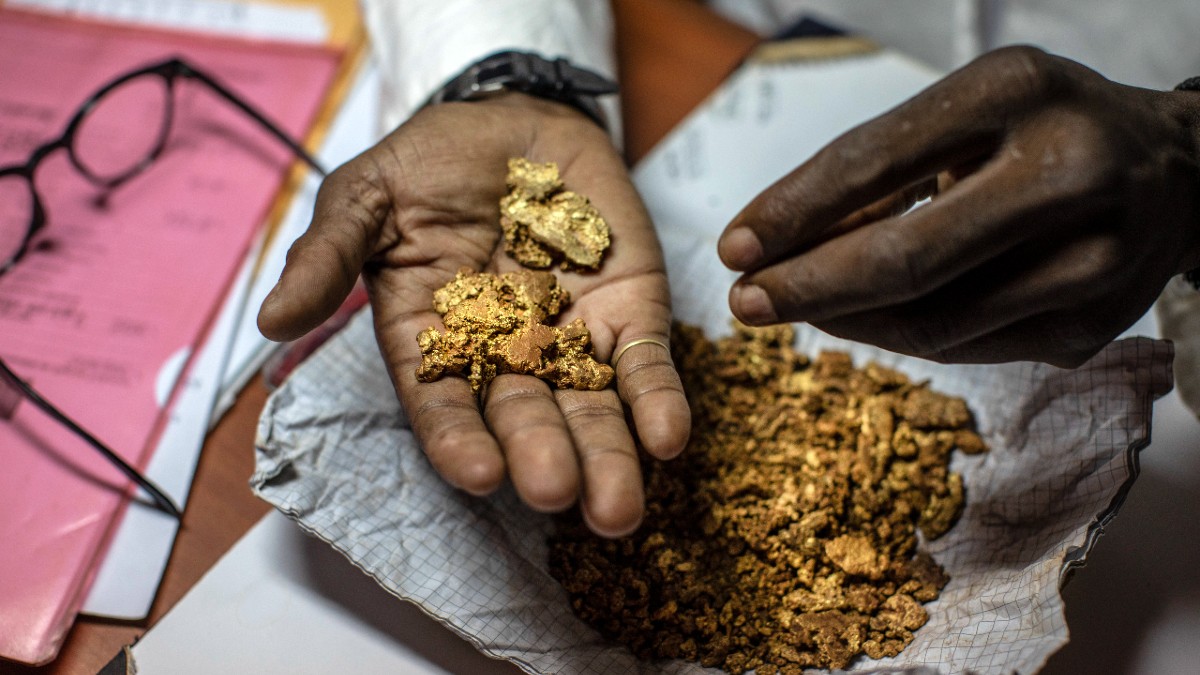Chinese gold miners shot dead in Central African Republic, Russia’s Wagner Group among suspects

BANGUI, CENTRAL AFRICAN REPUBLIC - MARCH 15: A diamond and gold dealer inspects nuggets of gold in his shop on March 15, 2021 in the capital Bangui, Central African Republic. The United Nations estimates that more than 30,000 people have fled the country due to the violence surrounding the latest elections in December last year, while tens of thousands more have been internally displaced. (Photo by Siegfried Modola/Getty Images)
There’s country risk, and then there’s calling in the Russian paramilitary.
Australian gold mines are looking a whole lot safer this morning after Chinese officials confirmed that nine Chinese nationals are dead and two have been injured after an attack on a Central African Republic (CAR) gold mine owned and run by the Chinese state-backed Gold Coast Group (黄金海岸集团).
The attack, confirmed by Chinese officials and reportedly drawing a furious response from President Xi Jinping, comes only few days after three Chinese nationals were kidnapped near the Central African Republic’s border with Cameroon.
The Chinese mine workers were shot to death in an organised assault by armed men at a mine in the CAR which has also left two other workers wounded, local sources told Agence France-Presse.
Speaking to AFP, Abel Matchipata, the mayor of the nearby Bambari, said “we have counted nine bodies and two wounded” following Sunday’s attack.
The bodies were brought to the capital of Bangui later that day. The Chinese embassy has asked Chinese nationals to not travel outside the CAR capital of Bangui.
The attack occurred around 5am local time after attackers overpowered the mine’s guards and opened fire. According to Matchipata, operations at the mine site had only taken place days earlier.
In a rare moment of official fury, Chinese state media are reporting that Chinese President Xi Jinping has called for the attackers to be “severely” punished.
The Chinese workers were at a site run by the Gold Coast Group, 25 kilometres outside Mr Matchipata’s Bambari township.
A decade of civil conflict has left violence rife across the Central African Republic, ever since Muslim-dominated armed groups ousted president François Bozize in 2013.
CAR crash mine security
This latest brazen attack comes just days after gunmen kidnapped three Chinese nationals in the west of the CAR near the border with Cameroon.
Three years ago, two Chinese nationals died during a spontaneous revolt against a Chinese-owned mine in the republic’s Sosso Nakombo mine in the south-west of the country. Before that, in 2019, three Chinese workers were killed in apparent retribution after a local leader died during a tour of the site on a boat trip.
Mines in the CAR have faced a number of security challenges in recent years as rebel groups seek to diminish mining operations owned and operated by foreign companies.
Several of the mines operating in the CAR are Chinese-owned, and the Chinese government has rated the CAR as an extremely high security risk for Chinese nationals.
The Chinese Ministry of Foreign Affairs (MOFCOM), has said it will continue to work closely with other government agencies to do everything possible to”protect the safety and security of Chinese nationals and companies in Africa”.
CAR President Faustin Archange Touadera has since planned a trip to China to reassure investors.
Local authorities did not release further details of the attack, nor was there any claim of responsibility.
State media reports all nine bodies were transferred to a Bangui hospital, in the presence of Chinese ambassador Li Qinfeng and CAR Foreign Minister Sylvie Baipo Temon.
Old tensions, rising
The outgunned local Coalition of Patriots for Change (CPC), a loose affiliation of anti-government groups with the stated aim of ousting President Faustin Archange Touadera, has already rejected suggestions they were behind the attack.
The coalition is aligned with the ex-0president Francois Bozizé, himself ousted in 2013.
The CPC instead called it a “despicable and barbaric” act, and pointed the finger directly at Russia’s particularly active Wagner mercenary group who’ve been operating in the region for several years, ever since Touadera invited Russian forces to bolster security, in the face of armed groups connected to the CPC.
By 2020 these groups had taken control of large swathes of the CAR and were turning their attention to the capital, Bangui.
Stiffened by Wagner mercenaries, Russian forces were able to halt the rebel offensive and eventually forced them out of most of their territories and cities they previously controlled.
Meanwhile, Xi is in Russia this week just as Beijing and Moscow are bolstering their military alliance and their joint presence across Africa.
The Russian paramilitary presence has been a source of its own tension, the Wagner Group has previously been accused by the UN of violence, harassment and intimidation civilians.
“One out of every three major infrastructure projects in Africa is built by Chinese state-owned enterprises, and one out of every five is financed by a Chinese policy bank,” Paul Nantulya of the US Department of Defense’s Africa Center for Strategic Studies, told AFP.
China in Africa
China is now the prime driver of world mineral prices and a number of Africa countries have become key beneficiaries
China’s constant thirst for all the goodies – the gold, the copper, the zinc, nickel … if it’s raw and a material, the communist Party is on it.
Consequently, they’re still bringing in well over US$100 billion worth of base metals alone, every year. That’s more than a quarter of the world’s supplies.
In this regard Africa plays a critical role in handing over these critical minerals for the Chinese economy.
In the case of minerals, China is almost exclusively reliant on Sub-Saharan Africa for its cobalt imports, and significantly reliant for manganese (the latter primarily from Gabon, SouthAfrica and Ghana).
Sub-Saharan Africa is also an important supplier of timber (mainly fromGabon, Republic of Congo, and Cameroon) and chromium (mainly from South Africa,Madagascar, and Sudan), accounting for around one-seventh of China’s global imports each. However, with respect to China’s imports of iron ore and copper, well, we’ve got that covered this week. Next week, it’s always hard to say.

UNLOCK INSIGHTS
Discover the untold stories of emerging ASX stocks.
Daily news and expert analysis, it's free to subscribe.
By proceeding, you confirm you understand that we handle personal information in accordance with our Privacy Policy.








